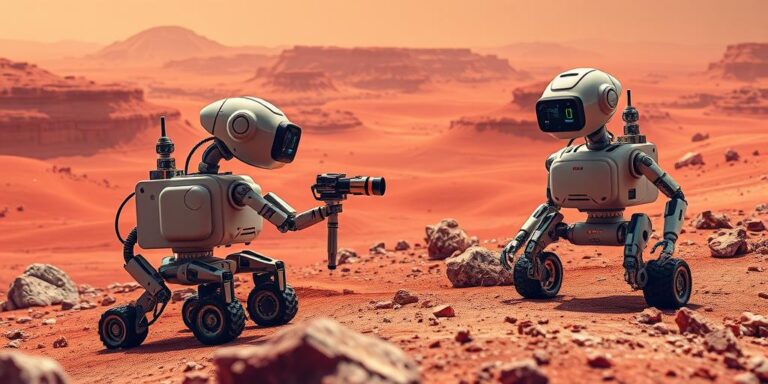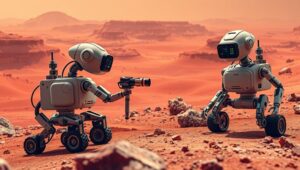AI in Space Exploration: Autonomous Missions to Mars (2030s)
Artificial intelligence (AI) is poised to revolutionize space exploration, particularly in the ambitious endeavor of sending autonomous missions to Mars in the 2030s. This article explores the critical role of AI in enabling these missions, addressing challenges, and highlighting potential benefits.
The Necessity of AI for Mars Missions
Human-crewed missions to Mars are fraught with challenges, including long transit times, radiation exposure, and the need for extensive life support systems. Autonomous missions, powered by AI, offer a viable alternative by reducing risks and costs.
- Decision-Making: AI systems can make real-time decisions based on sensor data, optimizing mission parameters and responding to unforeseen events without human intervention.
- Resource Management: AI can efficiently manage spacecraft resources such as power, fuel, and communication bandwidth, ensuring mission sustainability.
- Data Analysis: With the vast amounts of data generated during space missions, AI algorithms can identify patterns, anomalies, and insights that would be impossible for humans to detect in real-time.
Key AI Applications in Mars Missions
- Autonomous Navigation:
- AI algorithms enable spacecraft and rovers to navigate Martian terrain independently, avoiding obstacles and selecting optimal routes.
- Computer vision and machine learning techniques are used to process images and sensor data, creating detailed maps and localization systems.
- Robotics and Maintenance:
- AI-powered robots can perform maintenance tasks, repair damaged equipment, and construct habitats, extending the lifespan and capabilities of the mission.
- Advanced robotic arms and manipulators can conduct experiments, collect samples, and analyze data on the Martian surface.
- Scientific Discovery:
- AI algorithms can analyze geological data, identify potential sites for further investigation, and even make scientific discoveries autonomously.
- Machine learning models can classify rocks, minerals, and other geological features, providing insights into Mars’ past and present environment.
- Communication and Data Transmission:
- AI can optimize communication schedules, prioritize data transmission, and even translate scientific findings into plain language for easier understanding.
- Natural language processing (NLP) techniques can facilitate communication between AI systems and human scientists, enabling seamless collaboration.
Challenges and Considerations
Despite the potential benefits, there are significant challenges to overcome before AI-powered Mars missions become a reality:
- Reliability and Robustness: AI systems must be highly reliable and robust, capable of operating in extreme conditions and handling unexpected events without human intervention.
- Security: AI systems must be protected against cyber threats and unauthorized access, ensuring the integrity and security of the mission.
- Ethical Considerations: As AI systems become more autonomous, ethical considerations must be addressed, including decision-making biases and the potential for unintended consequences.
The Future of AI in Space Exploration
AI is poised to play an increasingly important role in space exploration, enabling more ambitious and cost-effective missions to Mars and beyond. As AI technology continues to advance, we can expect to see even more innovative applications in the years to come, paving the way for a new era of space discovery.
By leveraging the power of AI, we can overcome the challenges of space exploration and unlock the mysteries of the universe, bringing us closer to understanding our place in the cosmos.




